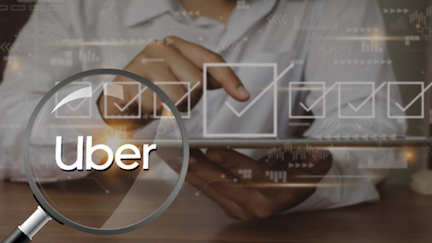What Does Uber Look for in a Background Check?

Anyone who has ever been denied a job with Uber or received a message suggesting their Uber background check needs attention knows the problems that can arise from an Uber background check. This article explains what Uber looks for in its background checks, your rights as a potential driver, and the potential issues in Uber’s background checks. Understanding the fundamentals of the Uber background check can help prospective drivers prepare for the screening process and alert drivers who have been denied the opportunity to drive for Uber of their rights.
What Does Uber Check?
Uber typically uses a third-party company called Checkr to run background checks on its drivers – both current drivers and those who apply to be a driver. The scope and subject of what Uber looks for often depends on local and state laws. Some cities or states require Uber to check employment history, while others may limit what Uber, through Checkr, can look for.
These background checks usually include several key items from a person’s history:
- Criminal history. Uber, through Checkr, scours and collects data from national, state, county, and local criminal records to identify any history of convictions.
- Uber specifically looks for convictions for violent crimes, crimes involving theft, property damage, and felonies. Uber says that it considers the circumstances surrounding the conviction, the time since the conviction, and evidence of rehabilitation before it disqualifies a driver. However, any convictions for violent crimes in the prior seven years will generally automatically disqualify a driver.
- An experienced attorney at a consumer law firm will be the best source of information on how your criminal history will affect your chances of driving for Uber.
- Uber also checks the national sex offender registry to ensure that its drivers have not been convicted of sexual offenses.
- Uber also checks terror watch lists. Inclusion on a watch list will usually disqualify an applicant driver.
- Driving history. Because Uber drivers will be driving people in automobiles, Uber checks their driving history. Like criminal background checks, this process involves scouring and collecting data from state motor vehicle departments.
- Uber is looking for major traffic violations, such as driving under the influence of alcohol and drugs, reckless driving, and excessive speeding tickets.
- Minor traffic violations will not automatically disqualify a driver applicant, but a pattern of careless and unreliable driving behaviors likely will.
- Recent traffic violations will have more weight in Uber’s decision to hire a driver than older ones.
- If the Uber background check reveals more common and less severe driving violations like speeding, denial or acceptance into Uber will depend on how many such violations the applicant driver has, the circumstances, and when they got them.
- Uber will verify that you have at least one year of driving experience in the United States (or three years of driving experience if you are under the age of 23).
- No credit check. The Uber background check typically does not include a credit check.
An Uber background check usually takes a few days but can take a few weeks. It depends on the driver’s history, the number of places they have lived, the responsiveness of the courts from which Checkr requests data, and the availability of databases.
Also, Uber conducts ongoing background checks on its current drivers to make sure that drivers remain compliant with Uber’s standards throughout their careers with Uber.
Legal Framework
Uber does background checks to make sure its drivers comply with its safety standards. Uber also needs to uphold its reputation and keep its passengers safe. In some jurisdictions, the law also requires background checks for certain jobs.
While many of the regulations are in place to protect passengers, there are also laws in place to protect Uber’s drivers. A background check is an essential component of the hiring process to keep people safe. But there are limits to what Uber and the third-party background check company Checkr can check, who they can give the information to, and what happens if Uber or Checkr makes a mistake.
In the United States, background checks are subject to a federal law called the Fair Credit Reporting Act (the “FCRA”). Congress passed the FCRA to set universal standards for background checks and employment screenings.
If Uber disqualifies you because of your background check, ask Uber the specific reason for the denial. The FCRA requires Uber to tell you the information in your background check report that prompted its denial decision. You have the right to review your Checkr background check report. The FCRA also requires Uber and Checkr to offer you a way to appeal that denial if they did not provide you with notice that they were considering adverse action. You can then offer additional evidence and additional context regarding the disputed information in your background check report.
There are times when an Uber background check will contain inaccuracies or errors. This can happen for many reasons. These include flaws in Checkr’s data retrieval or reporting processes, misspellings or wrong information submitted to the places that store city and state motor vehicle and criminal records, and failure to adequately review the reports. The FCRA also provides drivers with a way to dispute the denial if the reason for the denial is an outright error or inaccuracy in the background check report that Checkr provided Uber. If you were denied a job driving for Uber or recently fired from Uber because of an error in your background check report, contact Consumer Attorneys right away. We will assess your case and determine if legal action might be appropriate.
Uber’s background check process is an essential element in its commitment to safety. Uber must protect its passengers. However, sometimes, in doing so, they damage their drivers with unwarranted denials for driving jobs. Fortunately, the Fair Credit Reporting Act and consumer lawyers like the ones at Consumer Attorneys are there to offer some protection for the drivers.




















